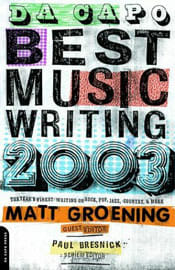Da Capo Best Music Writing 2003

Four volumes into its annual roundup of pop music writing, Da Capo appears uncertain how to top the terrifically varied 2001 and 2002 entries. Guest editor Matt Groening seems a slightly odd choice, and at just under 300 pages, his contribution to the series is neither long nor diverse enough to avoid feeling like something of a letdown. Still, Groening makes some fine choices, rescuing a number of terrific pieces from recycling-bin obscurity: Lynn Hirschberg reports on the manufacture of a (failed) teen-pop phenom; The Onion skewers indie rock insularity; and Gary Giddins offers a detailed year-by-year map of postwar jazz. I often found myself reading on despite a disinterest in the stories’ subjects—surely the hallmark of good journalism—for example, Terry McDermott’s blow-by-blow history (choose your own pun) of gangsta-rap pioneers N.W.A. Elvis Costello’s recent Vanity Fair snippet, matching each hour of the day with its ideal musical accompaniment, is the perfect bon-bon to bring this banquet—or, at least, really good buffet— to a close.
-

-

-

-

-

-

-

-

-

-

-

-

-

-

-

-

-

-

-

-

-

-

-

-

-

-

-

-

-

-

-

-

-

-

-

-

-

-

-

-








































